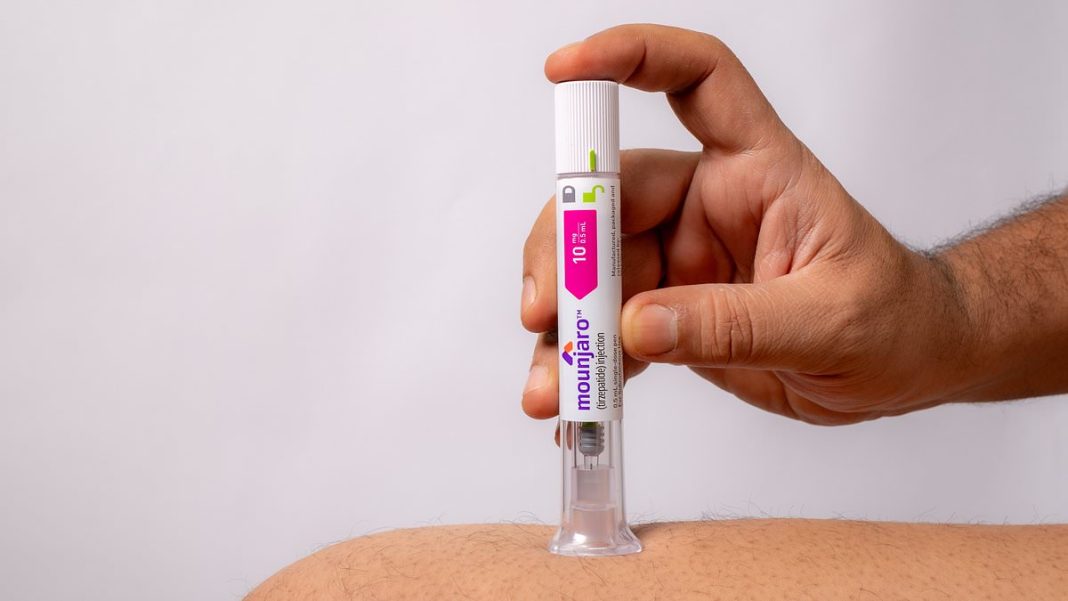GPs to dish out ‘King-Kong’ weight loss jab Mounjaro from today,
From today, obese patients in England will be able to access the ‘revolutionary’ weight-loss jab Mounjaro—free of charge—directly from their family doctor.
The weekly injection, also known as tirzepatide, will be offered to around 220,000 people over the next three years under new NHS prescribing rules.
Dubbed the ‘King Kong’ of slimming jabs, Mounjaro can help patients shed up to a fifth of their body weight in a year.
More than a million people in the UK are already using it via private clinics, where it costs around £250 a month.
Until now, only a limited number of patients could access it on the NHS via specialist weight-management services.
But uptake has been limited, with just 4,000 people a month starting treatment due to a lack of clinic capacity.
That changes today. GPs can now prescribe the drug to patients with a BMI over 40—classed as severely obese—and at least four obesity-related health conditions, such as type 2 diabetes, high blood pressure or sleep apnoea.
The move follows a Government decision earlier this year to expand access to GLP-1 medications—a new class of obesity drugs including Mounjaro and its rival Wegovy.
Health officials hope the rollout will ease pressure on overstretched NHS services by tackling obesity-related illness before it escalates.
Over the next three years, NHS officials plan to relax the health requirements for getting the drugs so that more patients will be able to start treatment.
And, within 12 years, around four million Britons are expected to be receiving NHS weight-loss jabs.
However, the rollout has already been criticised by experts who believe it is moving too slowly to tackle a national obesity crisis.
Nearly a third of British adults are obese, which costs the economy about £75 billion a year and contributes to more than 30,000 deaths.
Meanwhile, GPs have raised concerns that they do not have the time to offer more patients GLP-1 injections.
However, Health Secretary Wes Streeting said the rollout could help ‘end the obesity epidemic’.
He said: ‘Obesity jabs are used by 1.5 million people in the UK, mainly through private prescriptions.
‘The NHS was founded on a promise to ‘universalise the best’ and this Government is determined to bring revolutionary modern treatments to everyone who needs them, not just those who can afford to pay.
‘This rollout is an important step in making these medicines more widely available and beginning to shift the focus of healthcare from sickness to prevention.’
GLP-1 injections mimic the effect of a hunger hormone which is released by the stomach in response to eating and tells the brain when it is full.
In 2021, Wegovy—which contains the drug semaglutide, also found in Ozempic—became the first GLP-1 injection to be approved for use in the UK.
The drugs helps patients lose as much as 15 per cent of their body weight in less than a year.
Mounjaro, which was approved for use in the UK in 2023, is even more effective, with obese patients, on average, losing up to a quarter of their weight in 12 months.
Both Wegovy and Mounjaro are available privately to patients with a BMI over 30 – which classes them as obese—or over 27—they are deemed to be overweight, with at least one related illness.
But experts say that, due to the fact it is more effective, around nine out ten NHS patients who are eligible for weight loss drugs will receive Mounjaro instead of Wegovy.
If a Mounjaro prescription is approved, patients will initially need to have monthly face-to-face appointments with a ‘suitably trained healthcare professional’, such as a nurse.
During this period, patients need to be monitored for potential side effects.
While Wegovy and Mounjaro are considered safe for use, they can lead to uncomfortable symptoms such as nausea and indigestion.
In rare cases the injections can trigger severe side effects such as pancreatitis—a painful and potentially life-threatening swelling of the pancreas.
GPs will be required to provide nutrition and diet advice, along with physical activity guidance and psychological support, for a minimum of nine months after beginning treatment.
Some experts have criticised the NHS GLP-1 rollout plan as too slow.
At the present rate it will take 12 years to get the four million Britons who could benefit onto weight-loss jabs.
In May, a report published by the Tony Blair Institute for Global Change (TBI), the former prime minister’s think tank, described the NHS approach as ‘painfully slow’ and urged minister to offer as many as 15 million patients the injections.
The TBI warned that, without immediate action, the UK’s obesity crisis would cause the NHS to ‘collapse under the weight of chronic preventable disease’. Obesity raises the risk of deadly issues like heart disease, cancer, and dementia.
However, GPs groups have warned that family doctors do not have the time to offer weight-loss jabs to millions of patients.
‘While we recognise the potential benefits of weight-loss drugs, we know many GPs are concerned about the implications of the rollout of weight-loss drugs into general practice,’ said Professor Kamila Hawthorne, Chair of the Royal College of General Practitioners.
‘GPs and our teams are already working under intense workload and workforce pressures, and this must be factored into this rollout in order to guarantee it can be delivered safely.’
The news comes after new Government figures revealed that more than 100 deaths in Britain have been linked to GLP-1 injections.
The vast majority of fatalities, which have all been reported since the jabs were licensed for use in the UK, are not proven to have been caused directly by the drugs.
However, health chiefs tasked with policing the safety of medicines admit reports of side effects indicate ‘a suspicion’ they may have been to blame.
A total of 111 deaths were logged with the regulator, the Medicines and Healthcare products Regulatory Agency (MHRA), up to and including May 29.
In 2024, a British patient, Susan McGowan, 58, died after taking just two doses of Mounjaro. The Scottish nurse, experienced multiple organ failure, septic shock and pancreatitis. Hers is the only confirmed fatality linked to the jabs in the UK.






